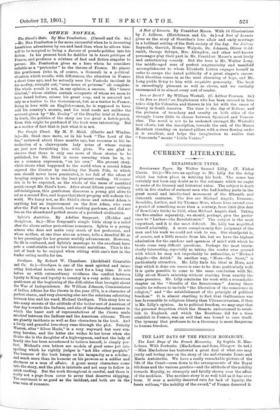C URRENT LITERATURE.
RENAISSANCE TYPES.
Renaissance Types. By Walter Samuel Lilly. (T. Fisher Unwin. 16s.)—We owe an apology to Mr. Lilly for the delay which has taken place in noticing his book. The cause has certainly not been any doubt as to the estimate which we ought to make of its literary and historical value. The subject is dealt with in five studies of eminent men who had leading parts in the great moral and intellectual movement of the fifteenth and sixteenth centuries. The five are Michael Angelo, Erasmus, Reuchlin, Luther, and Sir Thomas More, whose lives extend over a period of something more than a century, from 1455 (the date of Reuchlin's birth) to 1566, when Michael Angelo died. Taking the five studies separately, we should, perhaps, give the prefer- ence to " Luther—the Revolutionist." The subject is the most important, and it is the most difficult. Mr. Lilly has acquitted himself admirably. A more conspicuously fair judgment of the man and his work we could not wish to see. Our standpoint is, of course, not a little remote from his, but we have the highest admiration for the candour and openness of mind with which he treats some very difficult questions. Perhaps the most intrin- sically interesting, especially as taking the reader over ground with which he may not improbably be unfamiliar, is " Michael Angelo—the Artist." In another way, " More—the Saint," is particularly attractive. Mr. Lilly finds his ideal in More, and that which is done con amore is sure to be done particularly well. It is quite possible to come to the same conclusion with Mr. Lilly about More's saintship without starting from exactly the same premises. Mr. Lilly concludes his work with a remarkable chapter on the " Results of the Renaissance." Among those results he refuses to include "the liberation of the conscience in religion," and " the establishment of the principle of political freedom." It is almost startling to find that Gallicanism was less favourable to religious liberty than Ultramontanism, if that is Mr. Lilly's opinion. As to political freedom, we may urge that the personal despotism which the Stuarts endeavoured to estab- lish in England, and which the Bourbons did for a time establish in France, was an evil that was bound to cure itself. The tyranny that professes to be a theocracy is more dangerous to human freedom.














































 Previous page
Previous page